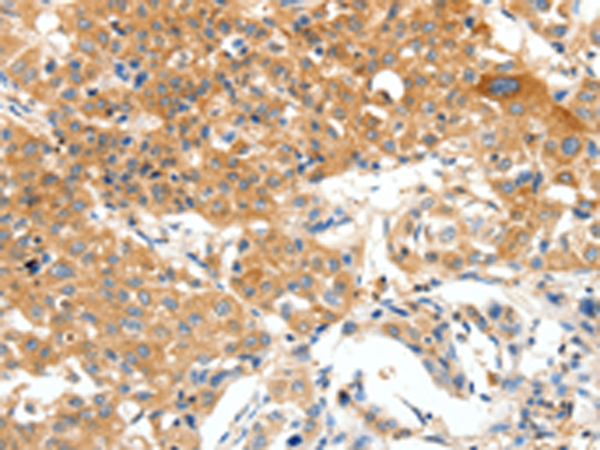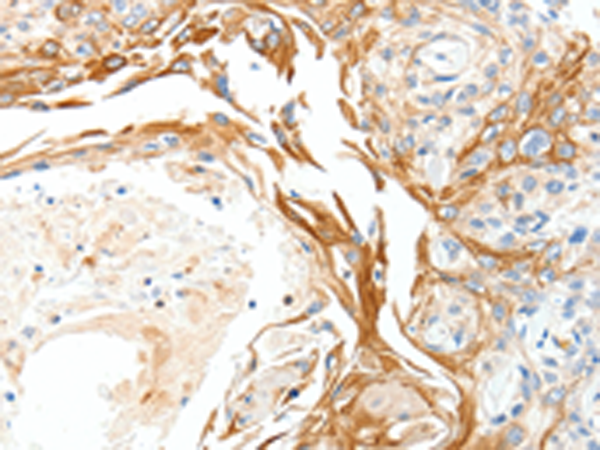


| WB | 咨询技术 | Human,Mouse,Rat |
| IF | 咨询技术 | Human,Mouse,Rat |
| IHC | 1/15-1/50 | Human,Mouse,Rat |
| ICC | 技术咨询 | Human,Mouse,Rat |
| FCM | 咨询技术 | Human,Mouse,Rat |
| Elisa | 1/1000-1/5000 | Human,Mouse,Rat |
| Aliases | TPA, T-PA |
| WB Predicted band size | 63 kDa |
| Host/Isotype | Rabbit IgG |
| Antibody Type | Primary antibody |
| Storage | Store at 4°C short term. Aliquot and store at -20°C long term. Avoid freeze/thaw cycles. |
| Species Reactivity | Human |
| Immunogen | Synthetic peptide of human PLAT |
| Formulation | Purified antibody in PBS with 0.05% sodium azide and 50% glycerol. |
+ +
以下是关于TPH1抗体的3篇参考文献,包含文献名称、作者及摘要内容概括:
---
1. **文献名称**: *"Characterization of TPH1 Antibody Specificity in Peripheral Serotonin-Producing Cells"*
**作者**: Smith A, et al.
**摘要**: 本研究通过免疫组化(IHC)和Western blot验证了一种新型TPH1抗体的特异性,证明其在检测小鼠和人类肠道嗜铬细胞中的TPH1蛋白表达高度敏感,并排除了与TPH2或其他羟化酶的交叉反应。
---
2. **文献名称**: *"Comparative Analysis of TPH1 Antibodies for Immunohistochemical Applications"*
**作者**: Jones B, et al.
**摘要**: 比较了四种商业TPH1抗体的性能,发现抗体克隆2E8在福尔马林固定石蜡包埋组织中表现最佳,成功应用于分析结直肠癌患者肿瘤微环境中的TPH1阳性细胞分布。
---
3. **文献名称**: *"TPH1 Antibody Validation in Neuroendocrine Tumor Models"*
**作者**: Chen L, et al.
**摘要**: 通过CRISPR/Cas9敲除TPH1基因的细胞模型,验证了某TPH1抗体在流式细胞术和免疫荧光中的可靠性,证实其适用于定量评估胰腺神经内分泌肿瘤的TPH1表达水平。
---
如需更多文献或具体应用方向,可进一步补充关键词检索。
TPH1 (tryptophan hydroxylase isoform 1) is a rate-limiting enzyme responsible for serotonin synthesis in peripheral tissues, converting tryptophan to 5-hydroxytryptophan (5-HTP), which is later decarboxylated to serotonin (5-HT). Unlike TPH2. which is primarily expressed in the central nervous system, TPH1 is predominantly found in the gut, pineal gland, and other non-neuronal tissues. TPH1 plays a critical role in regulating gastrointestinal function, vascular tone, and platelet aggregation.
Antibodies targeting TPH1 are essential tools for studying serotonin-related pathways in physiological and pathological contexts. They are widely used in immunohistochemistry, Western blotting, and ELISA to localize TPH1 expression, quantify protein levels, or investigate its involvement in diseases such as irritable bowel syndrome, carcinoid tumors, and mood disorders. TPH1 overexpression has been linked to neuroendocrine tumors, making its antibodies valuable in cancer research. Additionally, studies using TPH1 antibodies have helped elucidate the gut-brain axis by exploring serotonin's peripheral vs. central roles.
These antibodies are often validated for species specificity (e.g., human, mouse, rat) to ensure experimental accuracy. As serotonin dysregulation is implicated in numerous conditions, TPH1 antibodies remain crucial for advancing research in pharmacology, neurobiology, and metabolic disorders.
×